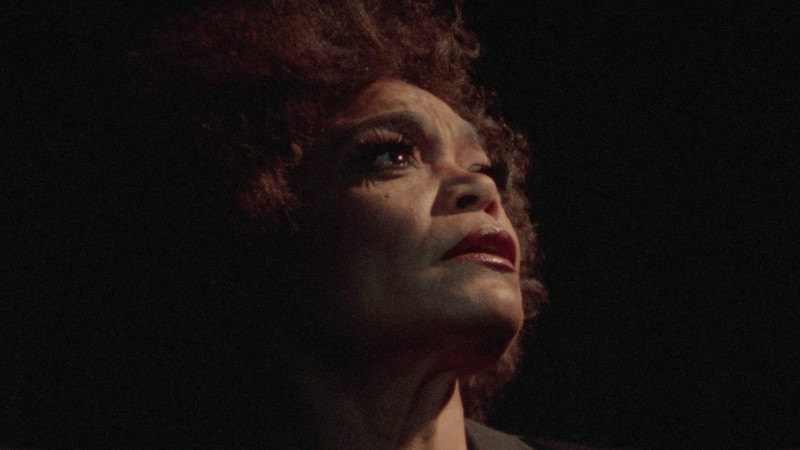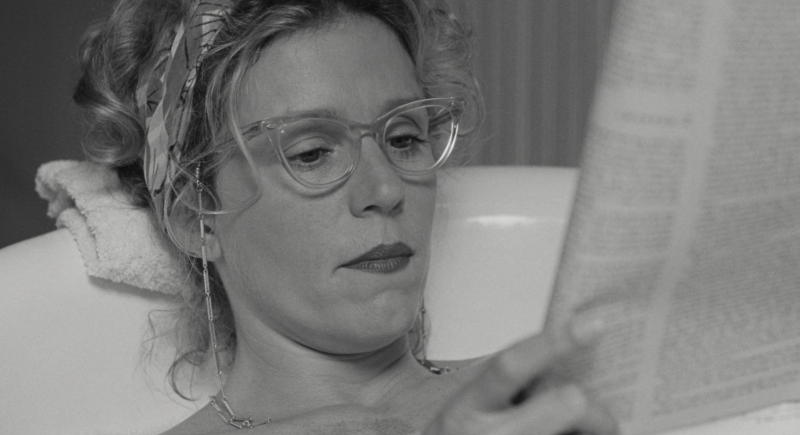Chef du Cinema: The Hit

I have enjoyed Stephen Frears’s 1984 movie The Hit so much over the years. It continues to blossom, unfolding to reveal new layers with every viewing.
I think John Hurt sums up the film quite well on the Criterion DVD commentary track: “It’s a travel movie, isn’t it? They go from place to place to place to place. And you don’t know where they’re going. The audience is led to believe they’re going somewhere, and they’re not quite sure where they’re going. Then it turns out nobody knows where they’re going, really. They’re just going. It’s a road movie and it’s a philosophical movie.”
The story, according to screenwriter Peter Prince, was inspired by real-life events of the time, having to do with a “supergrass” (Britspeak for big-time stool pigeon) named Bertie Smalls whose testimony put twenty-eight of his former friends/criminals behind bars—and an Ambrose Bierce short story. However, I’ve long been convinced it was also inspired by Hemingway’s “The Killers,” a story about two killers and their intended victim (which has been put on-screen twice already; those films are available in a lovely two-disc box set from the Criterion Collection, hint, hint). About a decade ago, a friend of mine in London was going to interview Frears, and I begged him to ask about that. Frears answered adamantly in the negative. But even if it wasn’t conscious, even if Frears and Prince were unaware of or hadn’t seen either version of the The Killers, The Hit is still in my mind a further exploration of that story.
But we shan’t philosophize too much. I’m here to write about food.
“‘I have a wide range of intolerances . . . I don’t eat meat or cows’ milk or wheat or sugar, coffee, tea, alcohol.’ So this one sentence, ‘Terence Stamp is coming to dinner,’ is possibly the single most terrifying thing you can say to a host or hostess anywhere on five continents.”
The above comes from a 2001 interview with Stamp, one of the film’s stars, in the Independent. While I can’t speak for the people of five continents, right here in my house, if Terence Stamp wants to come over for dinner, he is mostly surely welcome any old time. After all, I have the collection of recipes he cowrote with his friend Elizabeth Buxton, The Stamp Collection Cookbook, so feeding him would be no terror at all. Seriously, Mr. Stamp, I’ll cook and you can regale me with stories of London in the swingin’ ’60s and working with Fellini. Just give me a couple of hours advance notice to hit the supermarket.
The Hit came to Stamp at a most advantageous time because, as mad as it sounds, he was pretty much “coals and coke” (that’s Cockney slang for broke). He writes in Rare Stamps (one of his three autobiographies), “I would spend the morning deciding what I could sell to score the walking-around money I needed for the week.” Thankfully, his agent called with word that Frears was interested in meeting with him, and he got the part of Willie Parker, the supergrass.
In choosing a recipe to pair with this film, I kept trying to think what Willie Parker might make at home in his exile in Spain. At first, I thought of making one of the book’s seafood recipes—Spanish coast and all—but Stamp has written that he’s not really keen on eating anything that was once breathing.
And then I thought, Hmmm, what about breakfast or teatime? Willie might well long for something he wouldn’t be able to find in his small Spanish town. Something that would conjure up a childhood memory, perhaps? As it might for Terence Stamp.
Buxton writes that, one afternoon when she was having tea with Terence, “he started to reminisce about the wonderful Scotch pancakes that his mother used to make. We donned aprons and in a jiffy made up a batch of these pancakes.”
And there we are.
To accompany these pancakes (also known as drop scones, and closely related to American-style pancakes), I turned for inspiration to Stamp’s costar, John Hurt, who wrote in an article in the Observer: “For me, breakfast is berries. Blackberries, if I can get them, along with blueberries, raspberries, and strawberries. I don’t have anything with them, but my wife pours yogurt on top. She also has oatcakes—I prefer thin crispbread with marmalade or honey. And I have coffee, too, lots of it! I drink a whole cafetière. Strong black coffee, a mixed-bean blend from Soho—the Algerian Coffee House on Old Compton Street. I buy their most popular two-beans mix.”
And it just so happened that Stamp and Buxton have a recipe for bramble jelly—made with blackberries—in their cookbook. A perfect pairing with Scotch pancakes for breakfast or teatime.
Now, you’ll notice neither of the recipes has sugar. As Mr. Stamp explained in another interview, “Even if I have [sugar] inadvertently, I get spots on my face and my back. And as an actor, I can’t afford to do that.” No spots will occur from these recipes, folks, rest assured.
Scotch Pancakes with Bramble Jelly
Adapted from recipes by Terence Stamp and Elizabeth Buxton in The Stamp Collection Cookbook
Bramble Jelly (make at least one day ahead)
Makes 1 pint
28 ounces ripe blackberries
½ cup apple syrup and ½ cup water OR 1 cup frozen apple juice concentrate, thawed
2 tablespoons lemon juice
1½ –1¾ cups fructose (depending on desired sweetness)
Bring blackberries, apple syrup, and water (or juice concentrate), and lemon juice to boil in a 2½-to-3-quart pot and simmer gently for 30 minutes, crushing berries from time to time with a wooden spoon. Meanwhile, place two small plates or saucers in refrigerator to chill. These will be used later to test the jelly. Strain mixture into smaller pot through a fine mesh sieve or chinoise, mashing fruit with the back of wooden spoon. Stir in fructose. Return mixture to heat and boil rapidly for about 5 minutes.
To test whether jelly has reached its gelling point, turn off heat, remove one of the plates from refrigerator, put a spoonful of mixture on plate and return to refrigerator for a couple of minutes. Now run your finger across the blob of jelly. If jelly wrinkles as you do, it’s done. If not, return to boil for another few minutes and test again with second plate. When it’s gelled, carefully pour mixture into 1-pint Mason jar. Allow to cool to room temperature, then cover and refrigerate overnight before using (will keep up to a month in refrigerator).
Scotch Pancakes
Makes 12–16
2¼ cups all-purpose non-wheat flour
½ teaspoon baking soda
½ teaspoon cream of tartar
½ teaspoon baking powder
1 cup soy milk (and more if needed)
1 egg
2 tablespoons sunflower oil
Pinch of salt
¼ cup honey or agave syrup
2 teaspoons vanilla extract
Sift flour, baking soda, cream of tartar, and baking powder into large mixing bowl. Make a well in center and whisk in one cup soy milk. Break egg into batter and add oil, salt, honey or syrup, and vanilla. Whisk to mix thoroughly. Let batter sit for 5 minutes, then, if batter is too thick (it should have the consistency of pancake batter), gently stir in more soy milk.
Lightly grease (with cooking oil, no butter for Mr. Stamp) a frying pan or skillet, heat it, then drop large spoonfuls of the batter a few at a time onto pan. Make sure to leave room between pancakes. When bubbles appear and burst, flip and cook the other sides for a minute or two until golden brown. Serve with bramble jelly.
Ron Deutsch also blogs at chefducinema.com.




